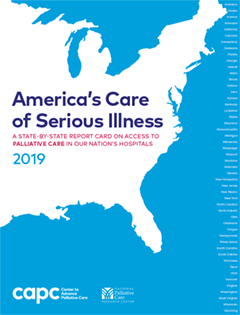Frequently Asked Questions
What is palliative care?
Palliative care is specialized medical care for people living with a serious illness. This type of care is focused on providing relief from the symptoms and stress of the illness. The goal is to improve quality of life for both the patient and the family.
Palliative care is provided by a specially-trained team of doctors, nurses, and other specialists who work together with a patient’s other doctors to provide an extra layer of support. Palliative care is based on the needs of the patient, not on the patient’s prognosis. It is appropriate at any age and at any stage in a serious illness, and it can be provided along with curative treatment.
Learn more about palliative care and to access the Palliative Care Provider Directory, at GetPalliativeCare.org.
Who requires palliative care?
Palliative care is appropriate for anyone living with a serious illness (e.g., cancer, cardiac disease, respiratory disease, kidney failure, Alzheimer′s, AIDS, amyotrophic lateral sclerosis (ALS) and more). It focuses on treating the symptoms and stress of the illness. The goal is improve quality of life
How do you pay for palliative care?
Palliative care is treated in the same way as other medical services (e.g. cardiology). Most insurance plans, including Medicare and Medicaid, cover all or part of palliative care.
How do you get palliative care?
Palliative care is provided in hospitals and often in outpatient clinics and at home. Patients need to ask their doctor for a referral to see the palliative care team. You can find palliative care in a hospital near you through the GetPalliativeCare.org Palliative Care Provider Directory.
Do patients have to give up their own doctor?
No. Palliative care teams are consultants and work together with the primary doctor.
Why a state-by-state report card?
The goal of the state-by-state report card is to determine whether seriously ill patients throughout the United States are receiving equitable care.
This issue is critical. There are millions of Americans living with serious illness, and this number is expected to more than double over the next 25 years with the aging of the baby boomers. Most seriously ill people will spend time in the hospital over the course of their illness.
What does the report card measure?
The report card measures the extent to which seriously ill patients and their families have access to palliative care teams in hospitals. Specifically, it examines variations at the state level in order to assess whether people facing serious illness throughout the United States are receiving equitable care.
Grades are based upon the percentage, per individual state, of palliative care teams in hospitals with fifty or more beds. They are the primary focus of the report card since smaller hospitals than this are unlikely to be able to support a full interdisciplinary palliative care team.
This national and state-by-state report presents the most accurate estimate to date of the prevalence of hospital palliative care programs in the United States.
Who conducted the study?
This report, an update of the 2011 edition, is the result of a collaboration between the Center to Advance Palliative Care (CAPC) and the National Palliative Care Research Center (NPCRC). The research team was led by R. Sean Morrison, MD, director of the National Palliative Care Research Center.
My state did not get a good grade, how can we improve?
Encourage hospitals within your state that do not have a palliative care team to implement one. Visit www.capc.org for help with tools, training and technical assistance. See Recommendations
Does palliative care have an impact on hospital and healthcare spending?
Palliative care teams provide an organized, highly structured system for delivering care in the hospital. By delivering highly-effective, rigorously coordinated care, palliative care teams have a direct impact on cost reduction through:
- Decreased ICU stays and pharmacy costs
- Decreased hospital costs through decreased lengths of stay and unnecessary tests
- Efficiently coordinated care transitions
What are the implications for Medicare and Medicaid?
The top 5% of health care spenders account for nearly 60% of all health care costs. This group is characterized by the presence of one or more serious illnesses.
Contact Us
Inquiries about A State-by-State Report Card on Access to Palliative Care in Our Nation’s Hospitals should be directed to:
Inquiries
Rachael Heitner, MPH
Associate Director, Research and Insights
Center to Advance Palliative Care
[email protected]
